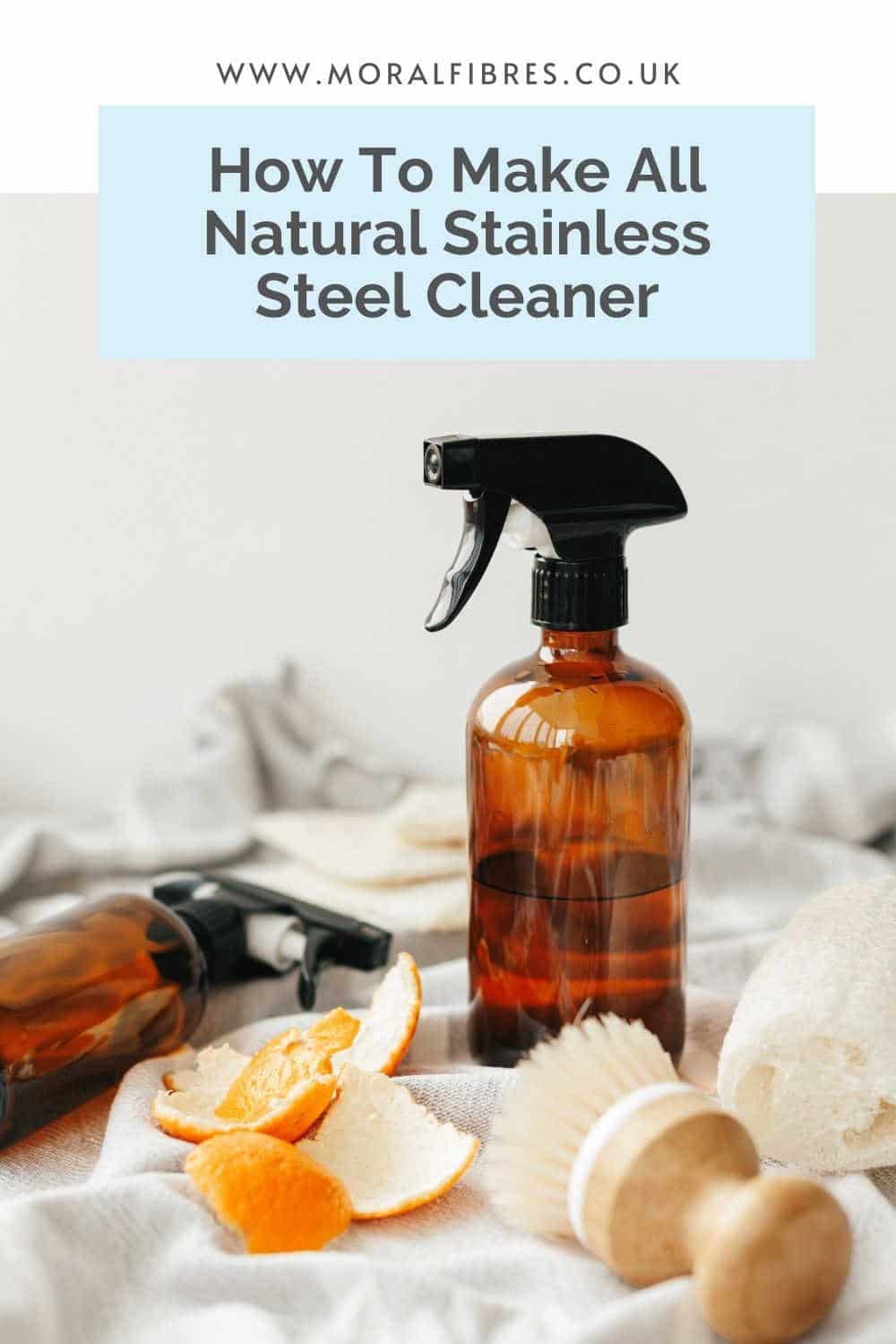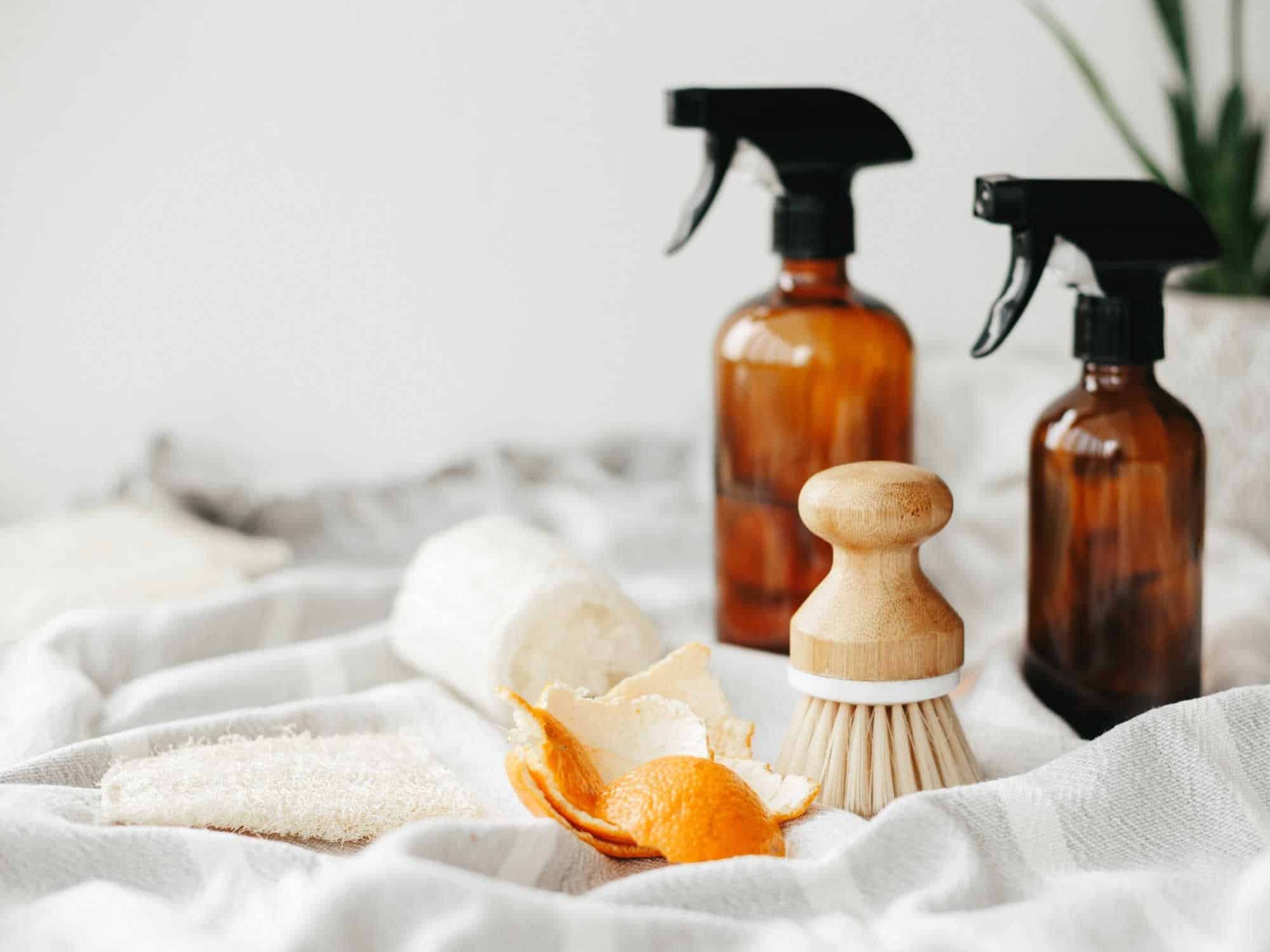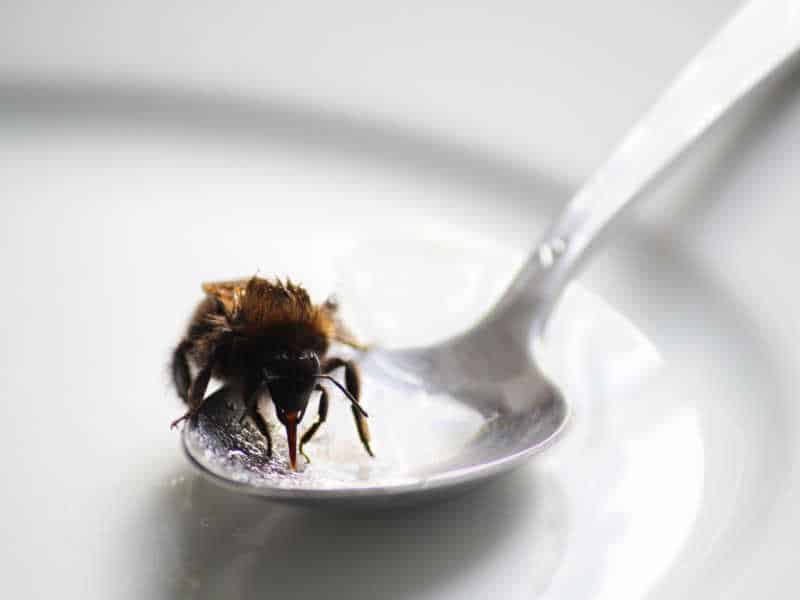Stainless Steel Cleaner: Make Your Own Eco-Friendly Version
To support the running costs of Moral Fibres, this post contains affiliate links. This means Moral Fibres may earn a small commission, at no extra cost to readers, on items purchased through these links.
Don’t buy bottles of chemically dubious stainless steel cleaner. Instead, let me show just how easy it is to make your own effective and eco-friendly version.
Did you know that stainless steel has only been around since 1913? For a material that’s only been in use for a little over a hundred years, stainless steel has quickly taken over our kitchens. In fact, as that article points out “it [stainless steel] has become the metal with which we are the most intimately acquainted; after all, we put it in our mouth almost every day.”
Stainless steel is now ubiquitous in our kitchens. From hobs to ovens, sinks to fridges, to worktops and cupboards. Some kitchens are even made entirely of stainless steel. However, all of that steel comes with some upkeep. I feel like the inventor of stainless steel was having a laugh when they named it. I don’t know if it is just me, but I feel like I can just look at a stainless steel worktop or fridge, and it can leave a mark!
As such, stainless steel does take a bit of cleaning to keep it looking spick and span. General multi-surface cleaners don’t quite have the power to give stainless steel a clean and shiny finish. Meanwhile, specialist stainless steel cleaners can be pricey. I say save your money, save on buying yet another plastic bottle, and use what’s (probably) lurking in your kitchen. Here’s the full how-to!
How to Make Eco-Friendly Stainless Steel Cleaner

Makes 500 ml
Keeps for up to six months or more
You Will Need
- 500 ml white vinegar
- Glass spray bottle
- Lemon, orange, or grapefruit essential oil
- Olive oil or coconut oil – whatever you have to hand
- Three cotton non-scratch cloths or rags
Method
I feel like it’s cheating a bit to list this as a recipe because this stainless steel cleaner is SO simple to make. But it’s so effective that I couldn’t not share:
- Add 20 drops of your citrus essential oil into your glass spray bottle.
- Next, decant the white vinegar into the bottle.
- Add the spray trigger, and you’re done.
Keep the oil and two of the rags or cloths to the side for now – you don’t need these right this second.
How To Use This Stainless Steel Cleaner
To use your homemade stainless steel cleaner, first, shake well to combine the oil and vinegar. Next, simply spray down any stainless steel surfaces that you want to clean. Leave it to soak for a few seconds, before wiping with the soft cotton cloth or rag.
Why cotton, you may ask. Well, I find cotton to be most effective at wiping down steel, as it doesn’t tend to leave any lint behind. It also won’t scratch your steel or remove the temperature markings from your hob or oven, unlike abrasive cleaning pads or sponges. Sidenote, if previous cleaning efforts have removed your oven and/or hob markings, I found an Etsy shop that specialises in stove stickers, to take the guesswork out of cooking. Genius!
Back to the cleaning! My top tip is to follow the grain of your stainless steel as you are cleaning. If you are wondering what this grain is, then you might be surprised to hear that stainless steel has a wood-like grain to it. If you look really closely at your stainless steel object, you should be able to see some faint lines running along the steel. Once you’ve found them, that’s the direction to follow when you are wiping.
Wiping against the grain makes it easier for dirt and grease to build up in the grain. Over time, this will decrease the shine of your stainless steel. This is not what we want to achieve so go with that grain!
Now that you’ve used the stainless steel cleaner, you next want to make that steel shine! Everyone swears by using baby oil for this purpose, however, baby oil is a mineral oil that’s made from petroleum. I like to avoid using fossil fuel products when cleaning my kitchen thank you very much.
Thankfully, natural oils such as olive oil or coconut oil do the job effectively, without any need to involve the oil and gas industry. All you have to do is apply a small amount of olive or coconut oil to your steel, and then, taking the clean dry cloth or rag, work the oil into the surface. Keep buffing until the streaks and stains disappear (and they will, I promise!).
Finally, for good measure, give your steel one last wipe down with the last clean cloth or rag to remove any residue, before standing back to admire your shiny handiwork!
Job done! The shinest stainless steel you’ve ever seen!
Why This Stainless Steel Cleaner Works So Effectively

This stainless steel cleaner works effectively because of its potent ingredients. Vinegar is acidic and can take on dirt, grease, and grime with ease in the kitchen. Meanwhile, citrus-based essential oils cut through oil like nothing else, meaning your stainless steel will come up spotless. The olive or coconut oil then promotes a shiny finish, without the use of petrochemicals.
Safety Notes
Although vinegar is a great all-natural cleaner, and perfect for cleaning stainless steel the eco-friendly way, there are a few safety considerations you need to make.
Firstly, do not use this stainless steel cleaner on granite, quartz, marble, natural stone, or similar. Vinegar is acidic and can damage these types of worktops. If you do have a stainless steel hob, for example, and these types of worktops, I would spray your cotton cloth and then wipe carefully to avoid touching your worktop, rather than spraying your hob.
Secondly, do not use vinegar to clean anything coated in metallic paint, as it can damage the paintwork.
Thirdly, if you have any stuck-on food stains, don’t reach for the bicarbonate of soda. Let the vinegar soak for a little while to soften the stain, before wiping. Bicarbonate of soda reacts with vinegar to create a weak salt water solution, that’s not good for cleaning.
And lastly, do not mix vinegar with bleach, products containing bleach, or hydrogen peroxide. Doing so can release noxious gases that can be very harmful to your health.
See my full guide to everything you need to know about cleaning with white vinegar for the full rundown.
Storage
As with any cleaning product, homemade or shop-bought, it’s important to both label the bottle and store your stainless steel cleaner away from children and pets.
Found this post useful? Please consider buying me a virtual coffee to help support the site’s running costs.





Thank you! I avoid chemicals at all costs so I’m really glad I found this!